
Dung beetles are beetles that feed on feces. Some species of dung beetles can bury dung 250 times their own mass in one night.

The scarab beetle subfamily Scarabaeinae consists of species collectively called true dung beetles. Most of the beetles of this subfamily feed exclusively on dung. However, some may feed on decomposing matter including carrion, decaying fruits and fungi. Dung beetles can be placed into three structural guilds based on their method of dung processing namely rollers, dwellers and tunnelers Dung removal and burial by dung beetles result in ecological benefits such as soil aeration and fertilization; improved nutrient cycling and uptake by plants, increase in Pasture quality, biological control of pest flies and intestinal parasites and secondary seed dispersal. Well-known members include the genera Scarabaeus and Sisyphus, and Phanaeus vindex.
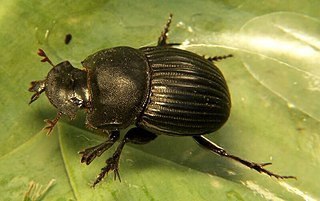
Copris is a genus of dung beetles in the tribe Coprini of the scarab family. It comprises more than 250 tunnelling species and has an almost worldwide distribution.

Musca vetustissima, commonly known as the Australian bush fly, is a species of fly found in Australia. It is the specific fly that has given rise to the expression "Aussie salute".
Amphionthophagus is a subgenus of Scarabaeidae or scarab beetles in the superfamily Scarabaeoidea. It is in the genus Onthophagus.
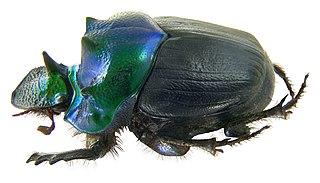
Diastellopalpus is a genus of Scarabaeidae or scarab beetles in the superfamily Scarabaeoidea. It was considered a subgenus of Onthophagus by some authorities.
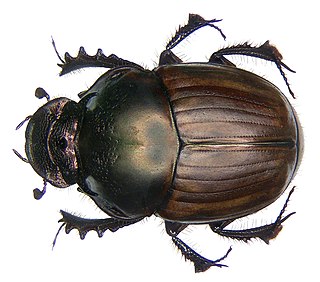
Digitonthophagus is a genus of Scarabaeidae or scarab beetles in the superfamily Scarabaeoidea. It was considered a subgenus of Onthophagus by some authorities. A review of the taxon was published in 2017.

Epirinus is a genus of dung beetles in the tribe Deltochilini of the scarab family. It comprises 29 species from southern Africa; a few species are widespread in the region, but most have limited ranges. Length ranges from 3.0 mm to 13.5 mm.
Euonthophagus is a genus of Scarabaeidae or scarab beetles in the superfamily Scarabaeoidea. It was considered a subgenus of Onthophagus by some authorities.

Oniticellus is a genus of dung beetles in the subfamily Scarabaeinae of the scarab beetle family.

Onthophagus is a genus of dung beetles in the Onthophagini tribe of the wider scarab beetle family, Scarabaeidae. It is the most species-rich and widespread genus in the subfamily Scarabaeinae, with a global distribution.
The Australian Dung Beetle Project (1965–1985), conceived and led by Dr George Bornemissza of the Commonwealth Scientific and Industrial Research Organisation (CSIRO), was an international scientific research and biological control project with the primary goal to control the polluting effects of cattle dung.

Onthophagus gazella is a species of scarab beetle. It belongs to the subgenus Digitonthophagus, which may also be treated as a genus. There has been some confusion regarding the application of the name.
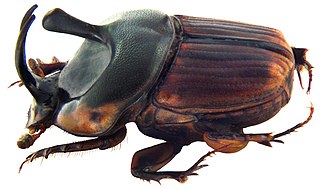
Oniticellini are a tribe of scarab beetles, in the true dung beetle subfamily (Scarabaeinae). Nearly all species of this tribe feed on and nest in dung, mainly that of large herbivores. Most are tunnelers; dung is buried at the ends of tunnels dug below a dropping, and used as food by both adults and larvae; others, known as dwellers make brood cavities within or just beneath the dung.
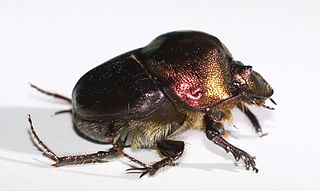
Proagoderus is a genus of Scarabaeidae or scarab beetles in the subfamily Scarabaeinae. It was considered a subgenus of Onthophagus by some authorities. It includes over 100 species native to Africa and Asia.

Coprini is a tribe of scarab beetles, in the dung beetle subfamily (Scarabaeinae). Scholtz et al. describe them as tunnellers that are shiny black, of moderate to large size and with a strongly convex shape. They also, however state that the grouping based on these characteristics has little phylogenetic validity, and the placement of several genera in this and related tribes is likely to change.

Liatongus is a genus of dung beetles in the subfamily Scarabaeinae of the scarab beetle family. At least part of the upper surfaces are without hairs; the head and pronotal disc are generally sculptured; and the genae are rounded, with little or no indentation between the clypeus and the genae. Length ranges from 7.4 to 10.9 mm. Colours vary: they may be uniform brown or dull purple, or have red, white or yellow patterns on the elytra.

Pleurophorus is a genus of aphodiine dung beetles in the family Scarabaeidae. There are more than 30 described species in Pleurophorus.

Euoniticellus intermedius is a species of dung beetle in the family Scarabaeidae.

Liatongus rhadamistus, or Scaptodera rhadamistus, is a species of dung beetle found in India, Sri Lanka, Laos and Thailand.























